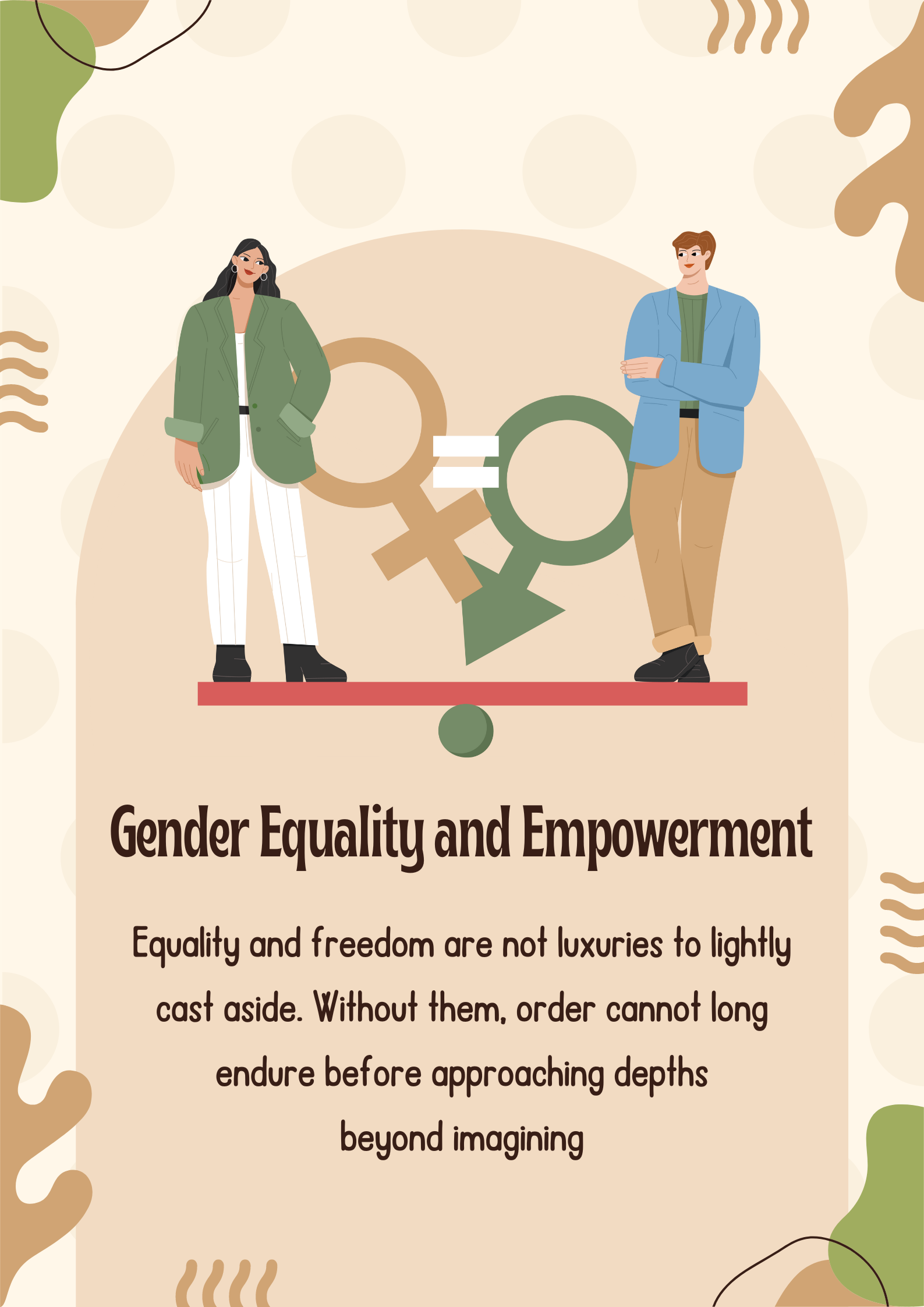Introduction
Gender equality is not only a fundamental human right but also a critical driver of sustainable development. When women and girls are empowered, they contribute to economic growth, improve health outcomes, and reduce poverty. Despite the undeniable progress made, numerous challenges to gender equality persist globally. Discrimination, violence, and limited access to education and employment opportunities continue to hinder the full realization of women’s and girls’ potential.
Challenges
Some of the key challenges to gender equality and empowerment include:
- Discrimination: Discrimination against women and girls in education, employment, and various domains restricts their opportunities and stifles their full potential. A comprehensive effort is needed to eliminate gender-based discrimination and create equal opportunities for all. (United Nations, 2020)
- Violence: Women and girls bear a disproportionate burden of violence, including sexual violence, domestic violence, and human trafficking. These acts of violence not only have grave physical and mental health consequences but also impede their full participation in society. Combating violence against women and girls is imperative for creating a safe and inclusive world. (Girls Not Brides, 2022)
- Lack of access to education and employment: In many regions, women and girls still face barriers to education and employment, limiting their economic opportunities and making them more vulnerable to poverty. Ensuring equal access to quality education and decent work is essential for achieving gender equality. (World Bank, 2022)
Opportunities:
Despite the challenges, several opportunities exist to advance gender equality and empowerment:
- Investing in education: Education is a powerful tool for promoting gender equality. When girls are educated, they are more likely to secure employment, earn higher incomes, and participate in decision-making processes. By investing in inclusive and quality education, we pave the way for a more equitable future. (Alkire, Meinzen-Dick, & Peterman, 2013)
- Empowering women and girls: Empowerment through access to legal and financial services, training programs, and leadership opportunities equips women and girls with the tools to challenge discrimination and advocate for their rights. Empowered women become catalysts for change in their communities and beyond. (Empowerment of Women, 2018)
- Changing social norms: Social norms often perpetuate gender stereotypes and discrimination. Transforming these norms is crucial for achieving lasting gender equality. Through educational initiatives, awareness-raising campaigns, and other targeted efforts, we can challenge and reshape harmful norms. (World Economic Forum, 2021)
Strategies:
To effectively promote gender equality and empowerment, several strategies can be implemented:
- Enacting and enforcing laws and policies: Legislative measures that uphold gender equality should be put in place and strictly enforced to protect women’s rights and eliminate discriminatory practices.
- Providing access to education and training: Equal access to quality education and vocational training for women and girls is essential for their personal growth, economic independence, and empowerment.
- Supporting women’s economic empowerment: Creating economic opportunities, promoting entrepreneurship, and ensuring fair and equal treatment in the workplace are vital for empowering women economically.
- Addressing violence against women and girls: Comprehensive measures should be taken to prevent and respond to all forms of violence, including improved legislation, enhanced support services, and educational campaigns to change societal attitudes towards violence.
- Changing social norms: Collaborative efforts involving educational institutions, civil society, media, and communities can challenge and transform harmful social norms that perpetuate gender discrimination.
One notable initiative that successfully promotes gender equality and empowerment is the Girl Rising campaign. Operating in developing countries worldwide, this campaign focuses on educating and empowering girls. Through strategic partnerships and storytelling, the campaign has reached over 100 million people, transforming the lives of countless girls by providing them with education and fostering their empowerment. (Girl Rising, 2022)
Call to action
To contribute to the advancement of gender equality and empowerment, consider the following actions:
- Engage in your community: Join organizations and initiatives dedicated to promoting gender equality, and actively participate in their activities to effect change at the grassroots level.
- Support gender-equality initiatives: Donate to organizations working towards gender equality, volunteer your time, or offer your skills and expertise to support their efforts.
- Raise awareness: Start conversations with friends, family, and colleagues about the importance of gender equality and discuss tangible steps they can take to make a difference in their own lives and communities.
By taking action and collectively working towards gender equality, we can build a more just, inclusive, and prosperous world for women and girls, fostering sustainable development for all.
Conclusion
Gender equality and empowerment are pivotal for achieving sustainable development. By investing in the education, empowerment, and well-being of women and girls, we foster a fair and equitable world that benefits everyone. It is crucial to continue advocating for gender equality, eliminating discrimination, addressing violence, and providing equal opportunities for all.


Tharushi Imasha Kumarasiri
Jun 24, 2023
0